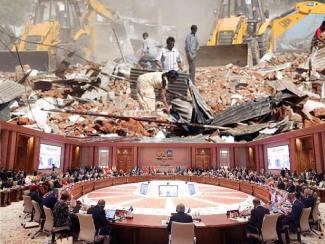There is a regime of fear in the city,
Is it a ghost? Oh no, it is the referendum!
- Habib Jalib
Revolutionary poet Habib Jalib wrote the above memorable lines during the 1984 Pakistani referendum on Islamization of the country’s legal framework. According to official figures, 97.8% of votes were cast in favor of President Zia-ul-Haq’s policies, but only 20% of the electorate participated in the referendum.
There was a similar chilling atmosphere in Delhi during the recent G20 summit. The city was under partial lockdown, slums were covered with green sheets, and the makers of the city – its ‘dirty underclass’ – were ordered to make themselves less visible. Whose prosperity were the G20 leaders talking about?
Clearly, the government’s chief aim was gaining maximum political capital out of the global showpiece. After all, the G20 Presidency is a rotating post. India’s membership means that India would have got its turn at the Presidency in any case. It was hardly an honor bestowed on the Prime Minister. Yet the summit was turned into a blatantly triumphalist celebration of Modi’s supposed global leadership, only for the balloon to be punctured by the Canadian assassination debacle, with the US and the UK both clearly supporting Canada.
However, it is also important to recognize what the G20 itself represents. In the months leading up to the summit, homes had been demolished and vendors had been evicted to beautify Delhi. The ‘cleaned up’ city – a smart city in the making - essentially stood for the G20 model of development: the remaking of spaces and lives through pro-rich and pro-corporate development financing.
An exploitative policy regime was written into the G20 architecture right from the start. The group was founded in 1999 after the Asian financial crisis of 1997-98 as an informal forum for the Finance Ministers and Central Bank Governors of ‘the most important’ industrialized and developing economies to discuss international economic and financial stability. In the wake of the global economic and financial crisis of 2007, the G20 became the premier forum for ‘international economic cooperation’. These twenty countries self-selected themselves by virtue of their 80% share in the global Gross Domestic Product. All committed to the market economy, they set out to shape the world in their own image.
The G20 this year decided to include the African Union as a permanent member of the forum – now, it is the G21. The inclusion of the African Union has been welcomed and lauded. But, as Praskanva Sinharay, associated with the Centre for Financial Accountability (CFA) which played a key role in putting forward a pro-people agenda before the G20 through the We 20 Summit, points out:
The move is in the interest of the rich nations that make up the G7, or Group of Seven, as African countries are major suppliers of vital minerals needed to meet energy challenges worldwide. The question, therefore, remains whether a permanent seat can enable the African countries to voice their concerns, such as of debt distress and the decolonization of the international financial system, within the elite platform.
India’s inclusion in the G20 marked the culmination of a steady drift, since the liberalization of the economy, towards complete integration with the Western market economies. It also aided India’s quest to emerge as an Asian giant which eventually aimed to economically outwit China. The United States invested in India’s growth partly to help keep China in check.
Indian multinationals have emerged as significant economic players in Africa and elsewhere - even as they remain underpinned by the financial centres in the City of London and Wall Street - and their interests have increasingly dominated economic policies domestically in a process which has been given a further massive boost with the rise of crony capitalism under Modi. The proposed farm laws which were withdrawn following the farmers’ protests (2021), and the quite indiscriminate facilitation of foreign players in the education sector (National Education Policy, 2020), provide us with some glaring examples of such policy approaches.
In fact, the Delhi demolitions and evictions weren’t only due to the summit. They are part of a policy regime – embodied in the Delhi Master Plan (2021-2041) and the labor codes – where dispossession of the working classes from land and homes and their reduction to precarious jobs are integral to urban development.
Business under the G20 model of course has a human face. It is all geared towards achieving 17 sustainable development goals adopted by the United Nations by 2030. Addressing poverty, reducing inequality, increasing access to health and education for all, and ensuring climate sustainability are all part of these goals. Except that the international financial architecture that lies at the heart of G20 has historically been instrumental is widening inequality, increasing poverty and exclusion, and worsening climate change.
The World Bank and the International Monetary Fund form the core of the G20. No wonder the New Delhi declaration merely repeated the existing pledges to the sustainable development goals without concrete commitments on addressing poverty, inequality and new ways of development finance.
The G20 summit in fact resolved to enhance the resilience of the global financial system, and called for increased monitoring by the Financial Stability Board. Such measures, like India’s now withdrawn Financial Resolution and Deposit Insurance Bill that was aimed at establishing a framework to deal with bad loans and bank failures, are designed to disproportionately burden the poor by exposing depositors to corporate borrower defaults, as Sinharay suggests.
The New Delhi declaration therefore marks a further affirmation of India’s commitment to neoliberalism Forces which are committed to fighting both pillars of the Hindutva/corporate alliance must therefore also actively counter the G20’s consensus on development. The last decade has witnessed vibrant resistance to neoliberalism across the world – notably in Latin America, where they have brought progressive and left forces to power in several countries, All those resisting Hindutva/corporate rule must build alliances with these forces internationally and further extend and strengthen people’s resistance to neoliberal exploitation, plunder and dispossession in India.









